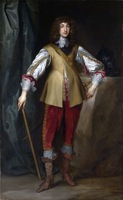Difference between revisions of "Cavalier"
m (Text replacement - "http://" to "https://") |
|||
| Line 3: | Line 3: | ||
==Origin== | ==Origin== | ||
Middle French, from Old Italian ''cavaliere'', from Old Occitan ''cavalier'', from Late Latin ''caballarius'' horseman, from Latin ''caballus'' | Middle French, from Old Italian ''cavaliere'', from Old Occitan ''cavalier'', from Late Latin ''caballarius'' horseman, from Latin ''caballus'' | ||
| − | *[ | + | *[https://en.wikipedia.org/wiki/16th_century 1589] |
| − | ''Cavalier'' derives from the same [[Latin]] root as the French word ''chevalier'' (as well as the Spanish word ''caballero''), the Vulgar Latin word ''caballarius'', meaning “horseman”. Shakespeare used the word cavaleros to describe an overbearing swashbuckler or swaggering gallant in [ | + | ''Cavalier'' derives from the same [[Latin]] root as the French word ''chevalier'' (as well as the Spanish word ''caballero''), the Vulgar Latin word ''caballarius'', meaning “horseman”. Shakespeare used the word cavaleros to describe an overbearing swashbuckler or swaggering gallant in [https://en.wikipedia.org/wiki/Henry_IV,_Part_2 Henry IV, Part 2], in which Shallow says "I'll drink to Master Bardolph, and to all the cavaleros about London."[2] |
==Definitions== | ==Definitions== | ||
:''noun'' | :''noun'' | ||
| Line 15: | Line 15: | ||
:1: showing a lack of proper concern; offhand: Anne was [[irritated]] by his cavalier [[attitude]]. | :1: showing a lack of proper concern; offhand: Anne was [[irritated]] by his cavalier [[attitude]]. | ||
==Description== | ==Description== | ||
| − | '''Cavalier''' was the name used by [ | + | '''Cavalier''' was the name used by [https://en.wikipedia.org/wiki/Roundheads Parliamentarians] for a supporter of [https://en.wikipedia.org/wiki/Charles_I_of_England King Charles I] and his son Charles II during the [https://en.wikipedia.org/wiki/English_Civil_War English Civil War], the Interregnum, and the Restoration (1642 – c. 1679). Cavaliers were also known as ''Royalists''. [https://en.wikipedia.org/wiki/Prince_Rupert_of_the_Rhine Prince Rupert], commander of much of Charles I's cavalry, is often considered an [[archetypical]] Cavalier. Their clothes were leather knee high boots, tunics and hats complete with plumes. |
==See also== | ==See also== | ||
| − | *'''''[ | + | *'''''[https://en.wikipedia.org/wiki/Cavalier_poet Cavalier poet]''''' |
[[Category: History]] | [[Category: History]] | ||
Latest revision as of 23:45, 12 December 2020
Origin
Middle French, from Old Italian cavaliere, from Old Occitan cavalier, from Late Latin caballarius horseman, from Latin caballus
Cavalier derives from the same Latin root as the French word chevalier (as well as the Spanish word caballero), the Vulgar Latin word caballarius, meaning “horseman”. Shakespeare used the word cavaleros to describe an overbearing swashbuckler or swaggering gallant in Henry IV, Part 2, in which Shallow says "I'll drink to Master Bardolph, and to all the cavaleros about London."[2]
Definitions
- noun
- 1:( Cavalier ) historical a supporter of King Charles I in the English Civil War.
- a: archaic or literary a courtly gentleman, esp. one acting as a lady's escort.
- b: archaic a horseman, esp. a cavalryman.
- c: a mounted soldier or a knight.
- 2: (also Cavalier King Charles )a small spaniel of a breed with a moderately long, noncurly, silky coat.
- adjective
- 1: showing a lack of proper concern; offhand: Anne was irritated by his cavalier attitude.
Description
Cavalier was the name used by Parliamentarians for a supporter of King Charles I and his son Charles II during the English Civil War, the Interregnum, and the Restoration (1642 – c. 1679). Cavaliers were also known as Royalists. Prince Rupert, commander of much of Charles I's cavalry, is often considered an archetypical Cavalier. Their clothes were leather knee high boots, tunics and hats complete with plumes.
